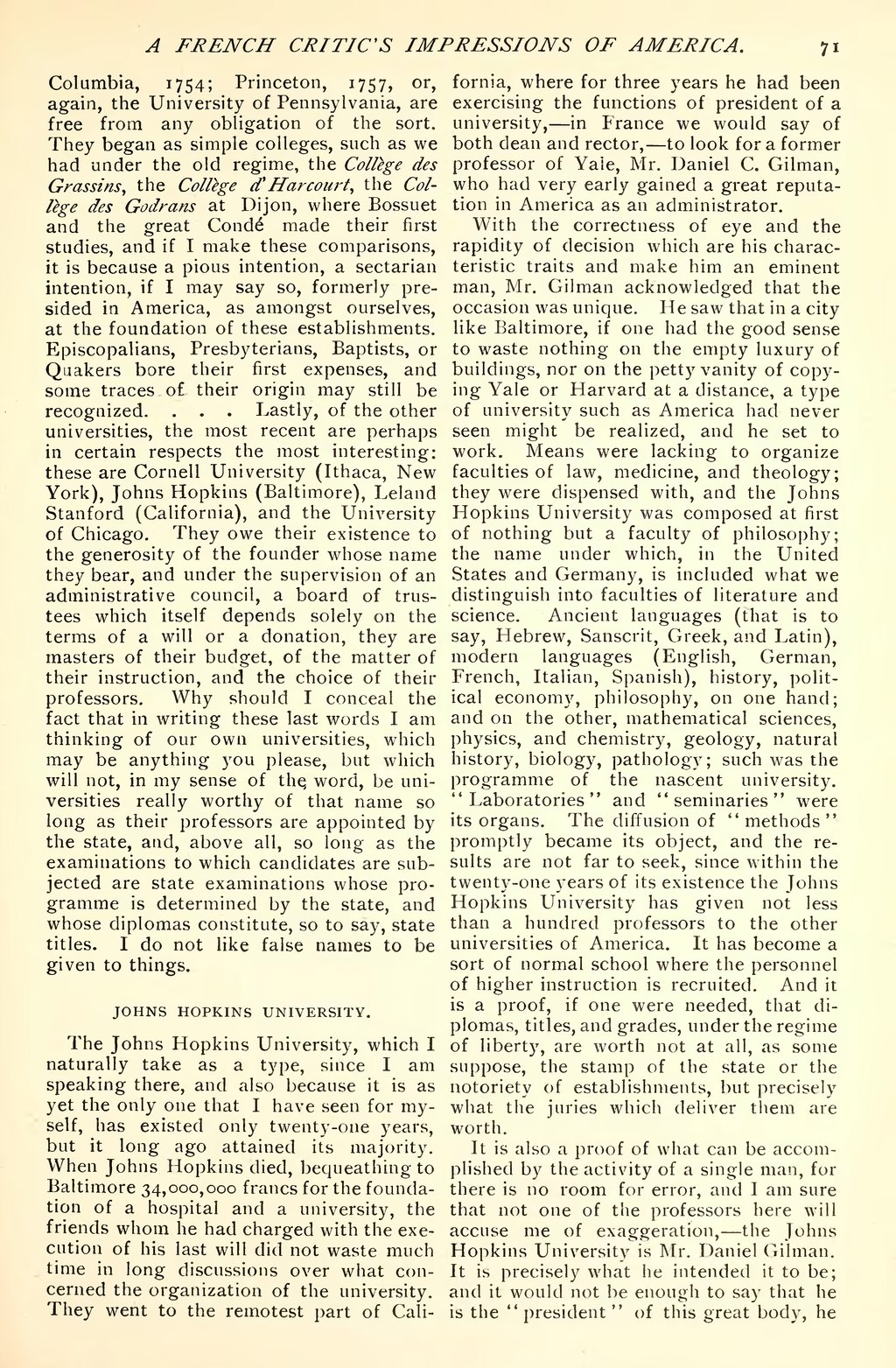Columbia, 1754; Princeton, 1757, or, again, the University of Pennsylvania, are free from any obligation of the sort. They began as simple colleges, such as we had under the old regime, the Collège des Grassins, the Collège d'Harcourt, the Collège des Godrans at Dijon, where Bossuet and the great Condé made their first studies, and if I make these comparisons, it is because a pious intention, a sectarian intention, if I may say so, formerly presided in America, as amongst oarselves, at the foundation of these establishments. Episcopalians, Presbyterians, Baptists, or Quakers bore their first expenses, and some traces of their origin may still be recognized. . . . Lastly, of the other universities, the most recent are perhaps in certain respects the most interesting: these are Cornell University (Ithaca, New York), Johns Hopkins (Baltimore), Leland Stanford (California), and the University of Chicago. They owe their existence to the generosity of the founder whose name they bear, and under the supervision of an administrative council, a board of trustees which itself depends solely on the terms of a will or a donation, they are masters of their budget, of the matter of their instruction, and the choice of their professors. Why should I conceal the fact that in writing these last words I am thinking of our own universities, which may be anything you please, but which will not, in my sense of the word, be universities really worthy of that name so long as their professors are appointed by the state, and, above all, so long as the examinations to which candidates are subjected are state examinations whose programme is determined by the state, and whose diplomas constitute, so to say, state titles. I do not like false names to be given to things.
JOHNS HOPKINS UNIVERSITY.
The Johns Hopkins University, which I naturally take as a type, since I am speaking there, and also because it is as yet the only one that I have seen for myself, has existed only twenty-one years, but it long ago attained its majority. When Johns Hopkins died, bequeathing to Baltimore 34,000,000 francs for the foundation of a hospital and a university, the friends whom he had charged with the execution of his last will did not waste much time in long discussions over what concerned the organization of the university. They went to the remotest part of California, where for three years he had been exercising the functions of president of a university,—in France we would say of both dean and rector,—to look for a former professor of Yale, Mr. Daniel C. Gilman, who had very early gained a great reputation in America as an administrator.
With the correctness of eye and the rapidity of decision which are his characteristic traits and make him an eminent man, Mr. Gilman acknowledged that the occasion was unique. He saw that in a city like Baltimore, if one had the good sense to waste nothing on the empty luxury of buildings, nor on the petty vanity of copying Yale or Harvard at a distance, a type of university such as America had never seen might be realized, and he set to work. Means were lacking to organize faculties of law, medicine, and theology; they were dispensed with, and the Johns Hopkins University was composed at first of nothing but a faculty of philosophy; the name under which, in the United States and Germany, is included what we distinguish into faculties of literature and science. Ancient languages (that is to say, Hebrew, Sanscrit, Greek, and Latin), modern languages (English, German, French, Italian, Spanish), history, political economy, philosophy, on one hand; and on the other, mathematical sciences, physics, and chemistry, geology, natural history, biology, pathology; such was the programme of the nascent university. "Laboratories" and "seminaries" were its organs. The diffusion of "methods" promptly became its object, and the results are not far to seek, since within the twenty-one years of its existence the Johns Hopkins University has given not less than a hundred professors to the other universities of America. It has become a sort of normal school where the personnel of higher instruction is recruited. And it is a proof, if one were needed, that diplomas, titles, and grades, under the regime of liberty, are worth not at all, as some suppose, the stamp of the state or the notoriety of establishments, but precisely what the juries which deliver them are worth.
It is also a proof of what can be accomplished by the activity of a single man, for there is no room for error, and I am sure that not one of the professors here will accuse me of exaggeration,—the Johns Hopkins University is Mr. Daniel Gilman. It is precisely what he intended it to be; and it would not be enough to say that he is the "president" of this great body, he
